Arc of the Poet
Part 1: Life Poetry
Part 2: Tour de Force
Part 3: True Love
Part 4: Spinning Out
Part 5: Wake-Up Call
Part 6: Serious Dreams
Part 7: Home Stretch
Part 8: Feedback
Part 9: Dear Departures
Part 10: Good Poetry
Part 11: Rewrites
Part 12: Resistance
Part 13: Fame and Fortune
Part 14: Ramblings
Part 15: Being
 From the great poem East Coker written by “American born, English” poet T.S. Eliot:
From the great poem East Coker written by “American born, English” poet T.S. Eliot:
Home is where one starts from. As we grow older
The world becomes stranger, the pattern more complicated
Of dead and living. Not the intense moment
Isolated, with no before and after,
But a lifetime burning in every moment
And not the lifetime of one man only
But of old stones that cannot be deciphered.
The freedom I enjoyed immediately after earning two bachelor’s degrees and completing my six-year Air Force Reserve commitment was wonderfully liberating, and my girlfriend Beth and I pressed ahead into our whirlwind adventures. My tiny backyard garage apartment in downtown Orlando became her home, too, over time, as we grew together. Meanwhile, facing our college debts, we both dedicated ourselves to earning paychecks.
Beth also earned her communications degree at the end of 1990, and by that time, she was already a seasoned bartender at the highly popular Bennigan’s Grill and Tavern in Casselberry. Right after graduating, she landed an apartment industry job in sales and management. That opportunity and others to follow were solid and stable, if sometimes stressful … but she jumped right in and thrived.
For me, the career path was much more erratic and hard to trace. In essence, I persevered in trying to open doors and earn the credits necessary to do the type of work I wanted to do (any skilled, challenging work in the film and television industry, with a preference for research, writing, and production), while clocking all the $10 hours I could book as an experienced clerical or audiovisual freelancer.
During a final college course, one professor told us all that as soon as we graduated, we’d be ready for entry-level jobs. At the time, the thought that everything I was going through to graduate was just a prerequisite for something “entry level” felt like being punched in the face. I felt strongly, and probably expressed my thoughts out loud: “What are you talking about? I do not need a college degree to get an entry-level job!”
Maybe I was technically right about that, but my first months after graduation proved that the types of more senior jobs I felt qualified for were beyond my reach. While trying to hold out for some interesting work on a film production or somehow shape-up a worthwhile solitary or joint-effort project through my resourcefulness, I did send out quite a few resumes and cover letters to apply for full-time jobs. I recall that one was for a communications position for Florida’s State Parks … which would have been fun if an offer had come through. None did.
As a backup, I put another plan into action. Coming into 1991, I had prepared a few polished submissions from my original poetry for writing contests. My hope — and also my expectation — was that the “Just” manuscript would win a major contest. When the correspondence arrived with icy reports featuring others’ names as winners, I was crushed, humiliated, and left to seriously consider: How did I not win?
Read “Arc of the Poet” chapter four “Spinning Out” now at https://t.co/Zuezg2mjDR. The freedom I enjoyed immediately after earning two bachelor’s degrees and completing my six-year Air Force Reserve commitment was wonderfully liberating.#poetry #amwriting #writerslife pic.twitter.com/jF1raWKdqk
— Roger Darnell (@RKDarnell) November 17, 2022
All things considered, those days were challenging in a lot of ways. Usually I was racing back and forth across Orlando’s byways in pursuit of work, then landing at odd times at home on Meridale Avenue, where Beth and I would reconnect, get recharged, and then head off again in separate directions. In the quiet moments, I would ponder my next literary moves, and try to assess all the ways my artistic efforts, diligence, preparation, practice, and polish fell short. Of course, looking through that microscope, I was really examining every facet of my life and trying to figure out what to do next to lead myself in the right direction.
Although I felt my career was “going nowhere fast” at that time, Beth and I held our own, and in the process, we enjoyed so many simple things together that not achieving instant literary fame became more acceptable. To my great fortune, she was always perfectly okay with me for who I was, and of course, it also helped a ton that her dad was constantly reminding me that “life is good” (even before it was on t-shirts), and cautioning me, “Don’t forget to stop to smell the flowers!” Like my own mother, he was always very encouraging to me, and Beth’s mom, step-dad, brothers, sisters, and all her friends also joined the growing support group that gave me a lot of self-respect to build on. Their positive examples and feedback trained me to begin appreciating everything life has to offer, while I kept my sites set on the entertainment industry, and continued to aim high.
Over the next few years, I became something of a fixture at Orlando’s downtown library, while studying and collecting the works of great classical and contemporary writers and artists in my spare time, and writing. Through research, I learned I needed to get better if I wanted my poetry to appear in The New Yorker, The Paris Review, and other high-profile targets I identified.
While originally my literary aspirations were driven by dreams of fame and fortune, my mom made a very important point with the following not-so-subtle newspaper clipping. As the editors at the New York Times Book Review “Noted With Pleasure” – using the enlightened words of Sam Hamill – writing poetry is not really a viable money-making proposition. It was a great lesson for sure, but as you’ll see, it took awhile for it to sink into my head.
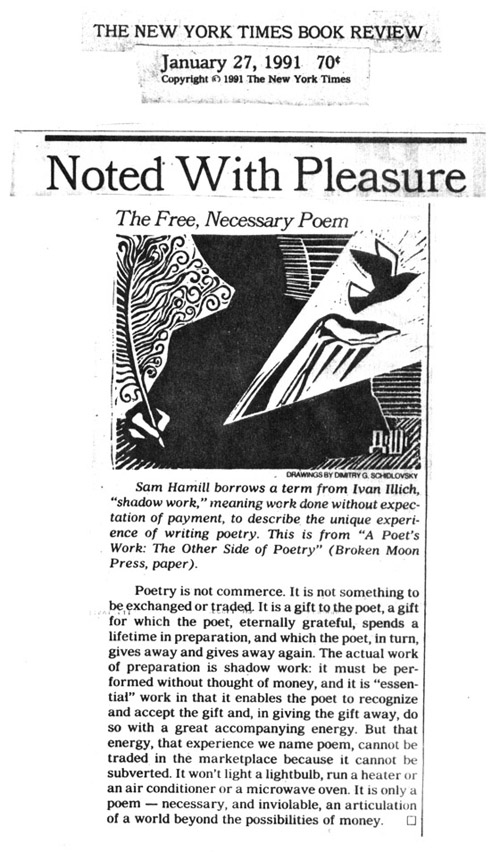
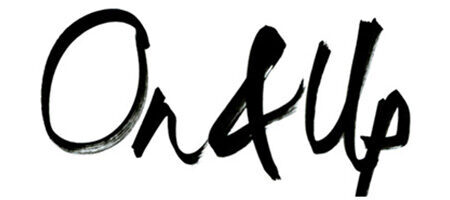
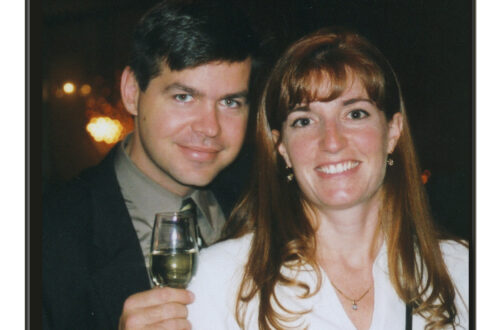
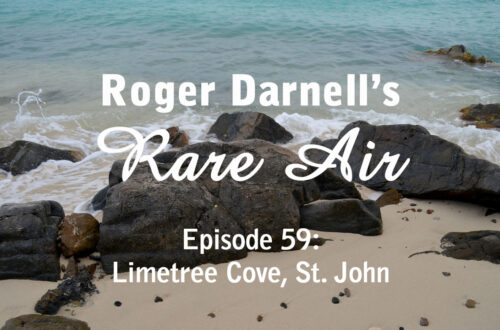
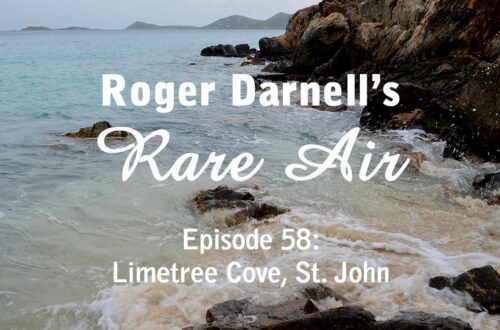
9 Comments on “Arc of the Poet, Part 4: Spinning Out”
Comments are closed.